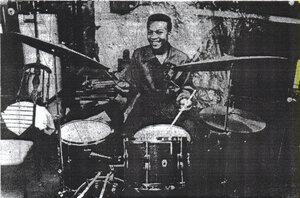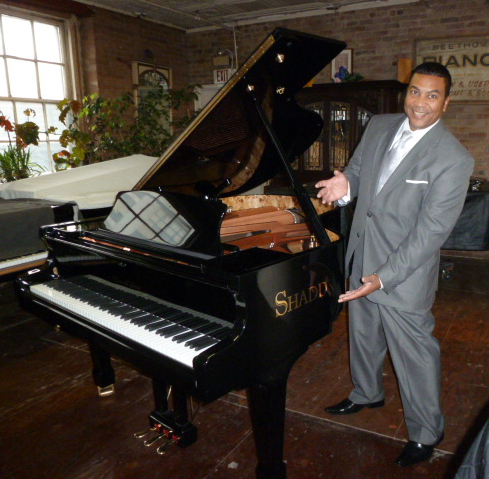Warren Shadd, a second-generation piano technician, and third-generation musician is the founder of the first Black-owned piano manufacturing business in the U.S.
He is the only black man to become the first large-scale commercial Black instrument manufacturer.
Shadd’s love for piano could be linked to his family’s talent for music. His grandparents were musicians. His grandmother was a ragtime pianist in the South in the ’30s, and his grandfather invented (although he never patented it) and performed on a collapsible drum set.
His father was a piano technician, restorer, builder, performer, and a trombonist. He had an aunt, Shirley Horn who was the NEA Jazz Master Pianist and vocalist.

While working as the exclusive piano technician for the Howard Theatre, his father took him four times a week to see James Brown, Count Basie, [Duke] Ellington, Pearl Bailey, Peggy Lee, Art Blakey, and the Jazz Messengers rehearsing.
“I’d see this all day long, every day. From the time I woke up, there were band rehearsals. Shirley Horn rehearsing in my basement with Billy Hart and Marshall Hawkins. We had pianos everywhere in my house, from the garage to the basement, sometimes even one of the upright pianos sitting in the kitchen, And musicians would come over to our house after the gig and play all night: Dude Brown, Bernard Sweetney, Steve Novosel, Roberta Flack,” he told NPR.
As a young boy, he loved to play the drums. He was adjudged a child prodigy when he played his first of many jazz concerts at the early age of four.

He soon learned to repair the piano from his father as he went everywhere with him. “Piano is what I know, drums is who I am,” he said.
At age 12, he had learned piano technology and could tune, rebuild and restore pianos which he did as a hobby.
While doing this piano for the fun of it, he was also performing. After high school, he went to Howard University where he joined the band with Wallace Roney, Geri Allen, Gary Thomas, Noble Jolley Sr., Carroll Dashiell, and Paul Carr.
In 1993, his father died and he took over the piano business. He already knew everything about the business and had a client base. “Coming in as the second generation of this business was phenomenal for me. Secure from being a musician on tour, it was a built-in job,” he said.
According to him, with the changing dynamics in the industry, he realized that rebuilding pianos were not what he actually wanted to do financially. “I would take these pianos and beautifully restore them … and somebody would say ‘OK, I’ll give you $600 for it…’ I’m like, ‘Dude, even the new strings I put on this cost four times that much!”
He quit the restoration business and started doing tunings and repair work. As a musician and an engineer and businessman, he figured out he could manufacture piano with the best of sounds after an encounter with a client.
He had studied and made a lot of research in the library and written his findings.
Shadd recalled: “One day, I was tuning a piano at this old man Mr. Tucker’s house. As I’m tuning his old upright piano, he started whimpering. I said ‘Mr. Tucker, what’s going on?’ He said, ‘It’s all right, Shadd, it’s all right.’ So I go on tuning the piano, then he really starts crying a lot. ‘What’s wrong, Mr. Tucker?’ He said, ‘Shadd, see that piano? See that name on the front of it? That should say, Shadd because you’re the only one!’ I said, ‘OK, Mr. Tucker, I’ve got these ideas, I’m gonna go back and study.’ He pretty much planted the seed.”
From there he began incorporating a lot of the soundboard technology that he’d invented unlike his grandfather; he has patents on all of this technology. He got the best team of piano manufacturers around the world to make pianos using his patents and designs.
In 2003, he founded Shadd Pianos USA, a piano, and keyboard Manufacturing Company. His first piano was sold to the Setai Hotel in New York, now called the Langham Place Hotel, and they play jazz on the piano seven days a week.

Although he wasn’t sure how Americans will react to the Shadd Piano at first, to his amazement, many people loved it, especially Church musicians. The Shadd has been named the official piano of the Vatican.
Shadd also became branding partners with Rolls Royce and American Idol, uses Shadd as its stage piano, and it is also the official instrument of the blockbuster television show, “Empire”.
Shadd built an interactive Piano for educational purposes making it possible for a piano teacher to see the student and vice versa.

For the first African-American piano manufacturer, his aim is to make the best piano in the world.
“I do know there’s a responsibility with this, to make the best piano, not one of the best – the best piano, period, in the world, and that’s what I believe I’ve done. As a people, we can’t be parallel; we’ve got to be three times as good. I’m a perfectionist, so every nuance that goes into this piano has to be the very best,” he stated.










